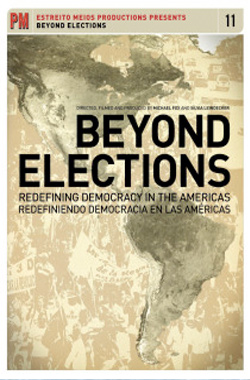
Desde los Consejos Comunales de Venezuela hasta el Presupuesto Participativo de Brasil; Desde Asambleas Constitucionales hasta movimientos de base, fábricas y cooperativas recuperadas en todo el hemisferio, Más allá de las elecciones es un viaje exploratorio e investigativo en las Américas que intenta responder una de las preguntas más importantes de nuestro tiempo: ¿Qué es la democracia?
La película de empoderamiento brinda ejemplos esperanzadores y concretos de todo el continente americano de personas que recuperan el poder y gobiernan sus propias comunidades. Más allá de las elecciones es una hoja de ruta para el cambio social, que se basa en los consejos comunales de Venezuela y los movimientos sociales en Bolivia para el presupuesto participativo en Brasil y las cooperativas de trabajadores en Argentina.
La película logra con gracia demostrar que estos ejemplos populares del poder de las personas se pueden aplicar en cualquier lugar. En particular, cuando los activistas en los Estados Unidos enfrentan los desafíos de la administración de Obama y la actual crisis económica, este oportuno documental muestra que una revolución política puede comenzar hoy mismo en su propia sala de estar o vecindario.
Más allá de las elecciones examina la democracia laboral. Tomando imágenes de The Take (2004), la película de Naomi Klein y Avi Lewis sobre una cooperativa de trabajo argentina, documenta las fábricas tomadas por los trabajadores, quienes no solo comparten el trabajo de administrar la fábrica sino también las ganancias. "Hemos formado un negocio democrático", dice José Abellí, líder en el movimiento de fábricas recuperadas en Argentina, "un negocio de personas, no de capital".
Más allá de las elecciones se sumerge en el escandaloso ámbito de la democracia popular, donde las opiniones chocan y la gente toma la idea del consenso tan seriamente que está dispuesta a participar en largas y minuciosas reuniones. Los cineastas no omiten opiniones sobre los debates que cubren, tomándose el tiempo para mostrar a los participantes que explican los proyectos en discusión.
Las comparaciones con las nociones de democracia en los Estados Unidos son inevitables. Sin describir en detalle el sistema político de los Estados Unidos como un punto de comparación, la película, sin embargo, lo considerará una crítica. La democracia electoral, tan triunfalmente glorificada e incluso promovida en el extranjero, no solo es insuficiente, sino que también es una traición a la democracia "en nombre de la democracia", como dice el escritor uruguayo Eduardo Galeano en la película. De hecho, Estados Unidos ha creado un monopolio sobre la definición de democracia, dice el sociólogo portugués Boaventura de Sousa Santos. "Pero en realidad", dice, "la democracia es un trabajo en progreso".
© 2014-2024 Digitalia - Todos los derechos reservados | Condiciones de Uso | Política de Privacidad | Ayuda | Help | Contacto